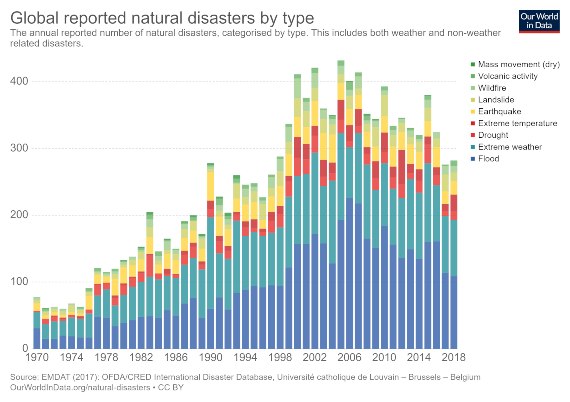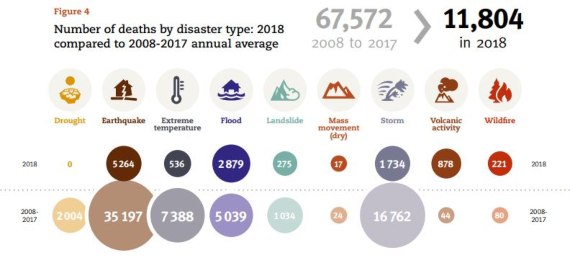With respect to the climate emergency, the survival of the human species is one of the biggest issues. Natural disasters, famine, and disease play a role in the future that awaits us, and clearly threaten our chances of survival.
As the following graph shows, the number of natural disasters, especially those related to climate change, follows an upward trend.

A deeper understanding can be gained by reading the summary produced by the Centre for Research on Epidemiology of Disasters (CRED). Their report reveals that the number of deaths caused by weather-related disasters (torrential rain, landslides, floods, fires, etc.) is significant compared to the previous decade’s total (2008-2017).

And yet, CO2 emissions have not declined despite the commitment made in the Paris Agreement to limit temperature increases by implementing measures such as setting the “right” price for carbon.
From this perspective, food is one of the biggest concerns. What will we eat in the future? What crops can be cultivated on damaged land? Will there be enough food for everyone? While these are serious concerns, work is being done to address them. On one hand, new foods are in development; and on the other, efforts are being made to reduce our ecological footprint to the greatest extent possible.
What does science suggest we do to counter this doomsday view?
Entomophagy
A scholarly word that means to eat insects, something that 2 billion people already do. Little by little this practice is becoming more common as insects make their way to the shelves of supermarket chains.
Recycling
If we can convert our waste into sustenance and water, we will stem two problems — pollution and the lack of food — at once.
Nanobionic vegetables
Plants are much more than mere food and can drastically improve everyone’s quality of life. One one hand, this revolutionary discipline seeks to make the most of vegetable species by improving their adaptability and resistance in the face of climate change. And on the other hand, it aims to maximize their nutritional properties.
Technosols
Because humans have the power to degrade their land in a very short time, it is good news that soil sciences have made advances that have produced technosols (soils containing more than 20 percent of human-manipulated materials.) Their purpose is to try to better retain water, recover land that has suffered erosion degradation, and if all else fails, to try to make other planets habitable.
Comments on this publication